#coal shortage
Explore tagged Tumblr posts
Text

"FEAR COAL FAMINE; TRACTION COMPANY TO RESORT TO OIL," Vancouver Sun. October 9, 1912. Page 3. --- B. C. Electric Applies to City for Permission to Install Auxiliary Tanks on Main Street. --- MATTER IS URGENT, SAYS REPRESENTATIVE ---- Trouble Over the Connection of the Burnaby Line at Commercial Drive ---- Bearing out the reports printed exclusively in The Sun as to the possibility of a coal shortage in Vancouver unless a settlement be soon effected with the striking coal miners on Vancouver Island, the British Columbia Electric yesterday took action that indicates a fear that there will be a coal famine within the next few weeks which will seriously cripple their service. To meet this condition they petitioned the board of works for leave to lay a temporary siding on Union street, on which they could place oil tanks to supply their bollers with a portion of the fuel they require.
In a letter to the board Chief Engineer Conway of the B. C. Electric pointed out that if there was shortage of coal it would be absolutely necessary that they have some other means of keeping their boilers going.
City Engineer Fellowes was in sympathy with the request of the company, but the members of the committee refused to allow unprotected oil tanks on the street.
Might Burn False Creek. Ald. Baxter pointed out that if they should catch fire, the whole bed of False Creek would be in a blaze within a brief interval and half the property along the shore be destroyed.
A representative of the company who was present declared that the matter was urgent. The company wanted the tanks within the next week or fortnight, and could not wait to put in permanent tanks, as certain members of the committee proposed they should.
It was eventually decided that the company should be allowed to put in underground tanks, which would com- ply with the regulations of the Under- writers' association. The privilege is, however, only given for six months, and the tanks have to be so placed as not to interfere in any way with the traffic on the street.
B. C. E. Up Against It. Apparently the B. C. Electric company is up against it in the matter of making connections between the Burnaby line and the city service at Commercial drive.
Three years ago council gave the company permission to make a temporary connection, and now the B. C. E. want it to be made permanent. In a letter to the board of works they stated that an order for the connection had been made by the railway commission, but as the railway commission's jurisdiction ceases at the end of the Burnaby line's private right-of-way, it was evident, and the board satisfied itself that there was and could be no order regarding the Commercial drive connection.
Some of the members of the committee wished to give the company peremptory notice to take their curve out, but better counsels prevailed and finally it was decided that the engineer be asked to write and ascertain just what the company proposes to do. The feeling of the committee is that the company should find some other means of connection with the city.
Street Is Impassable. A deputation from Commercial drive asked the council to have the street made passable as soon as possible. They said that on their part of the street there were twenty-two stores vacated, simply because there was no access to them.
The city engineer placed the blame partly on the Bitulithic company. which has the contract for paving the street, and partly on the fact that material had to be found for other streets, where pavement had been begun first.
Several members of the deputation stated that the sidewalk facilities were even worse than the roadway. Many buildings have to be moved back, and in places there is not room for people to get into the shops. The matter will be taken up a once by the proper officials and all the relief possible given.
It will be two months, according to Chief Engineer Fellowes, before connection can be made between the sewerage system of Point Grey and that of Vancouver.
#vancouver#vancouver island#coal mining#coal miners#strike#coal shortage#heating coal#capitalism in canada#heating oil#municipal politics#infrastructure project#fuel tanks#road building#false creek
0 notes
Text
I came across a xiaohongshu post that showed pictures of an abandoned traditional village in a mountainous region of China with very little surrounding greenery that had the captions: “so sad how traditional villages like these are empty and abandoned”
But the top comment was: “I am so happy for the villagers who finally made it out of the mountains and into new homes in prosperous cities. It often takes multiple generations of hard work to get the entire family out. Every family in this village achieved this. What you are looking at is the evidence of their success!”
And the second highest liked comment was: “You can tell this area has poor agricultural resources. The ancestors of the villagers were likely forced to settle here because more powerful villages have occupied the attractive fertile lands. Who knows how long they had been trapped here? I’m glad they finally made it out!”
Another comment with high likes: “My grandparents’ village was like this. Poor air quality from burning coal in poorly ventilated buildings. Bitterly cold in the winter. Dry and hot in the summer. Short growing seasons. And there was always a shortage of water. My parents got factory jobs in the city and after working and saving for years, they finally got all of us out.”
And it occurred to me how when we romanticize old fashioned villages and mourn the loss of the type of community they provided, we sometimes downplay and overlook the extraordinary liberation and agency that industrialization brought and brings to people who in previous generations had no option but to remain where they were born for most of their lives.
9K notes
·
View notes
Text
Red Sea ripples spread across trades
The repercussions of the Red Sea crisis have been longer-lasting and more severe than many shippers thought. Shippers expected delays proportional to the extra sailing time. They may have expected proportional cost increases as well. But they did not count on such factors as the extreme congestion in Singapore and in other ports. And in ports that have become pivotal, there are looming shortages…
#Australia Coal Exports#Capesize Ocean Shipments#Changing Trade Routes#Chinese Coal Imports#Global Shipping Trends#Global Trade Disruptions#International Coal Trade#Logistics#Maritime Trade Shifts#Mongolian Coal Exports#ocean shipping#ports#Rail Infrastructure in Mongolia#Red Sea Crisis#Russian Coal Imports to China#shipping delays#Shipping Equipment Shortages#Singapore Port Congestion#supply chains#Trade Logistics
0 notes
Text
Excerpt from this story from Grist:
Within weeks, the nation will deploy 9,000 people to begin restoring landscapes, erecting solar panels, and taking other steps to help guide the country toward a cleaner, greener future.
The first of those workers were inducted into the American Climate Corps on Tuesday during a virtual event from the White House. Their swearing-in marks another step forward for the Biden administration’s ambitious climate agenda. The program, which President Joe Biden announced within days of taking office in 2021, is a modern version of the Climate Conservation Corps, the New Deal-era project that put 3 million men to work planting trees and building national parks.
During the ceremony, the inaugural members of the corps promised to work “on behalf of our nation and planet, its people, and all its species, for the better future we hold within our sight.”
The American Climate Corps was among the first things Biden announced as president, but it took a while to secure funding and get started. More than 20,000 young people are expected to join during the program’s first year, according to the White House, with new openings appearing on the American Climate Corps job site in the months ahead. The pay varies depending on the location and experience required, with open positions ranging from around $11 to $28 an hour.
The administration is promoting the corps as a way for young people to jump-start green careers. In April, the White House announced a partnership with TradesFutures, a nonprofit construction company, a sign that the program might help fill the country’s shortage of skilled workers who can help electrify everything. The White House will also place members in so-called “energy communities” like former coal-mining towns to help with environmental remediation and other projects.
��Whether it’s managing forests in the Pacific Northwest, deploying clean energy across the Southwest, or promoting sustainable farming practices throughout the heartland, the president’s American Climate Corps is providing thousands of young Americans with the skills and experience to advance a more sustainable, just tomorrow,” White House climate advisor Ali Zaidi said in a press release on Tuesday.
2K notes
·
View notes
Note
I work in resources and can help! The transition from Mercantilism to Capitalism varies around the world. Mercantilism came before it. It's similar to capitalism, but much more state-centric. Raw materials were brought cheaply from out of state, often colonies, and then more expensive finished products were manufactured and sold to increase the (what now would be) GDP of the nation.
In Mexico and the Andes, Spanish merchants would often abandon poorly made trade goods, like breeches, jewelry, silk stockings, on natives' doorsteps, and then take by force the 'payment' they were owed. Donkeys, mules, llamas, money, weaving, cloth- anything of value. Colonies were the cheapest way to do this, obviously, because you often taxed the raw material going out (a tenth of silver went to the crown) along with the cost of mercury to produce the silver. And then money was made selling back to the colony.
So, very similar to capitalism with a working merchant-class, but primarily focused on raw goods and "mass produced" items were still hand-made and local.
The switch to capitalism happens when private owners begin to take control of production and work management. We can see this in England in the early-1800s when individual estate owners began to exploit the coal on their property: much more focused on bank loans, investment from other private funds, and depended on technology detaching manpower as the limiting factor of production. If we think of nitrates and gunpowder detaching the amount of people you can kill from the amount of people on either side of the battle, technology did this for production.
When you can create an unlimited number of bedsheets with mechanical looms, you're only limited by raw materials (cotton) and the number of looms you have. Which is why we see an explosion of exploitation for both people and materials.
I guess the TL;DR answer to the question is Neither. Capitalism is a fundamental transition of a state so that their production is only limited by raw materials extracted, and demand for the product.
Thus, improvements in capitalism = improvements in the removal of manpower as the limiting factor of production = increases in the amount of resources necessary to produce one item.
Question, since my knowledge is a bit more shaky in this area:
Would the emergence of 'capitalism' be more of a French Revolution thing (with the transition from a feudalistic to capitalist society), or would it come a bit later with Marx's and Engels popularization of the revolutionary stages of history? Or is it a bit of both/neither?
I’m gonna be honest, my expertise is the Pueblo II-IV periods in 900–1450 CE US Southwest, with some experience in 1800s New England and the Bronze Age Aegean. The emergence of capitalism is not my forte; I was counting the beginning of capitalism from the Industrial Revolution in the late 1700s. I now recognize that that’s a much more complicated question than I gave it credit for!
#There's a lot to unpack between the two tbh. I hope the definitions and breakdown actually make sense.#I used Spain and England as my merc/indu examples because I know them best but it's also no shocker they were early superpowers#because 1) they actually had nitrates to battle with: Spain from Peru and England from India. 2) Early colonialist empires.#I was going to say one has coal to exploit and one doesn't but I just looked at Spain and they actually have a bunch of coal.#So I'm going to have to do some digging on why Spain didn't take off the same way. It could also be they were busy putting down the#Mexican revolution at the same time as England was scrambling to recover from losing America. Luck and timing had a lot to do with it.#Spain also would've been suffering from a silver shortage at the same time because they invested so much in S. America while#England (luckily unluckily?) had South Africa and India to exploit as well.#BUT. ANYWAY. Tldr you could do this inspection with any nation. All of them make the transition. China is an excellent modern comparison.#Sorry for jumping in Artemis!!! Realized after writing I saw emergence of capitalism and blacked out. ^^'
35 notes
·
View notes
Note
Can you shed any light on how Santa came to give naughty children coal, when coal used to be a reasonably useful present?? I tried googling it but nothing that came up seemed researched better than folk wisdom, or modern-day people trying to make it make sense.
Considering that the holiday has come to dominate upwards of 1/12 of the cultural calendar every year in much of the world - there has been shockingly little academic research done on the history of Christmas and Christmas traditions. So unfortunately folk wisdom is kind of all we have on this subject.
Coal has long been associated with various cultural figures who fall under the "winter gift-bringer" archetype. The Italian witch-like figure Befana brings coal or ashes to bad children, and the Basque Olentzero was traditionally a charcoal burner by profession. However, as most folk-lore consists mainly of unwritten cultural tradition, it is very difficult to determine exactly when and how these figures developed, and what, if any, influence they had on one another.
(For the duration of this I'm going to dub any item brought by Santa as a punishment as an 'anti-gift' for a lack of a better term. Also, the following information is specific to the continental US, as that's the area I most focus on.)
To begin with - coal, in the anti-gift sense, does not necessarily refer to valuable high-grade anthracite. It could just as easily refer to low-grade industrial coal or even charcoal. It was also given in such small quantities (small enough to fit in a child's sock, as that's what stockings were originally) as to be worth almost nothing, no matter the quality.
I actually tend to agree with what most modern articles written on this subject theorize - which is that coal was just a conveniently located item that every household had. Stockings were traditionally hung on the mantle or around the stove, so the coal scuttle was right there for any disgruntled parents looking to punish their child's misbehavior.
This theory seems to be supported by other anti-gifts I've come across in Dear Santa letters which appear to be overwhelmingly fireplace related - ashes, sticks, sand (commonly used in fire buckets) and once even buffalo chips.
Ashes in particular were a very common anti-gift in much of the US in the late 19th/early 20th century. Though often the belief was that Santa would throw ashes in your eyes if you peek at him, rather than leave them in your stocking for bad behavior.
By far the most common non-fireplace-related anti-gift I come across in Dear Santa letters is switches (as in branches/rods used for corporal punishment). I've only done the scantest of formal documentation on the subject but, just given my general observations, - I'd say that switches were just as common of an anti-gift as coal, if not more so, up until the mid-20th century when corporal punishment/spanking began becoming less culturally acceptable. I have also noted that switches were noticeably more common in the Southern US, where it is not uncommon to see them mentioned in Dear Santa letters well into the 21st century (though my attempts to document any very recent data on this has been somewhat complicated by the introduction of the Nintendo Switch.)
Coal being a relatively useful and valuable item seems to have been a joke for as long as it has been a tradition, and it is not at all uncommon to see adults pointing out that fact - especially during strikes and shortages.

Even in times of scarcity, I suspect most stocking coal ended up right back in the coal bucket, as I can't imagine most children were interesting in keeping it - thus costing the parents (or Santa) absolutely nothing.
Was coal the traditional anti-gift where any of you grew up, or was it something else?
#sorry for the late response#I accidentally put this in my drafts instead of my queue#christmas#traditions#history#coal#dear santa#asks#long post
186 notes
·
View notes
Text
in a world in which the sarah jane adventures is the title of a series of murder mysteries:
our main character, obviously sarah jane smith, is an intrepid journalist valiantly pursuing a career as an agatha christie protagonist. no matter how often london's local authorities and grieving parents politely ask her to fuck off, she refuses to let injustice go ignored. perhaps more impressively, she actually has managed to solve several of the murders. half the men she meets seem to want to date her - a pity, then, that she's already engaged.
christopher smith (the fifth doctor), long-suffering ma student at the nearest university and captain of its cricket team to boot, is not capable of time travel, and would definitely die if killed. he does not have any mysterious powers to travel between parallel worlds, and even if he did, he definitely does not come from parallel worlds. that would be weird, and he's perfectly normal, and he is not going to let miss smith find out about any of this, even if it kills him. but of course it wouldn't matter if it killed him, because it's not like he has nine lives or anything.
tegan jovanka, australian and working in london, is christopher's best friend and really is totally normal...
...unlike one of coal hill's teaching assistants, the unpersonable vislor turlough, who is almost certainly not an alien from another a planet.
he happens to be the assistant to one of coal hill's maths teachers, an amnesiac known to most as the brigadier. no one is quite sure how he got the position, nor are they aware that he was reported missing by the edinburgh police.
let it never be said that coal hill has a shortage of strange characters. just ask the chemistry teacher, mr. chesterton, whose efforts to search for missing student and part-time arsonist ace mcshane have proved fruitless.
oh, and it goes without saying that the new vicar mr. east probably isn't going to be accused of murder by miss smith any time soon.
98 notes
·
View notes
Text
Gold and coal
Johannes was a passionate influencer. When he felt like it. Actually, he only called himself an "influencer" because it sounded better than "slacker" or "professional son". He actually made a good living from his parents' money, which he spent at parties, shopping and traveling.
"So, what do you think of my cute new hat? I found it at this very cool market here in Ankara. It goes well with the necklace, doesn't it?" There were fewer likes on the picture than usual. Comments instead. Critical comments. Why he suddenly has such a beard. Johannes grabbed his chin. He had no beard, he had no beard growth at all. And he had carefully retouched the picture before posting it on Instagram. There had been no beard. But still: the photo above the caption clearly showed a beard…

He would have to deal with it later. Johannes had a full schedule. Working out at a gym, which surprisingly enough actually wanted to pay him, a visit to a Turkish bath and cocktails and dinner at a trendy rooftop bar in the evening. Even though Johannes was a hedonist, he was usually well organized and punctual. But at the gym, his schedule started to slip. He trained harder and longer than usual. He felt full of energy. And the traditional Turkish bath and hammam were fantastic. He met super interesting people there. Surprisingly, in the two weeks he had been traveling around Turkey, he had picked up more Turkish than he thought he would. He struck up conversations with people and they got on with each other using their hands and feet. Actually, he should have been up on the roof terrace, styled and with a gin and tonic in his hand, when he left the Turkish bath with a real Turkish stallion. The two of them had shagged like Johannes had never shagged before in his life. Johannes' hair was still oily from the scalp massage. He was sweating. His stallion asked him if they wanted to have another cup of tea and a shisha. They did. And then Johannes was fucked again in the stallion's apartment!

"as-salāmu ʿalaikum, brothers! Today will be a great day. I'm going on a tour of the insider tips in Ankara with my brother Hakan today. But now it's time to pray. salla Allahu 'alaihi wa sallam."
There was a hail of question marks as comments. Friends asked whether he had gone mad. But he also received positive feedback. Because of his style. Because of his faith. These comments were mostly in Turkish or Arabic. Both languages that Johannes (or Yahya, as he called himself here) understood more poorly than well. But he recognized praise in every language!
Hakan and Yahya had a great day. In public, they were the typical machos, but Hakan knew the places in Ankara where there was good, hard sex. Yahya sucked a minister's cock in the station toilet. And got 200 US dollars for an obviously good performance. Enough money for a good evening in the hammam and a good shisha afterwards.
The apartment that Hakan and Yahya shared was small and stuffy. The housing shortage in Ankara was no different to anywhere else in Turkey. But thanks to their small extra income, they at least had three rooms. Pure luxury for two people.

For Yahya, Instagram and other social media were actually just full of sin and Western decadence. But of course they were important media for receiving news from his brothers. His own account existed. Nothing more. He followed a handful of fellow believers who posted frequently, but he didn't really have any followers himself. He still had an old account from his school days. His name was still Johannes. But he hadn't looked in there for years.
Working at the bazaar as a porter was hard and exhausting. But the bazaar was full of niches where you could earn money with services that his sheikh shouldn't know about. Although Hakan thought he had shagged the sheikh before. But Yahya didn't really believe that. But he didn't really care… The main thing was that he and Hakan had enough money and fun. They prayed for that. Not necessarily five times a day. But about ten times a week. If they sucked more cock, they prayed more often. And Yahya sometimes had to pray very often. He was grateful that he didn't stand out too much with his hairy body and bushy beard. But the blond hair was exotic. And many customers were willing to pay a lot for sex with a blond Muslim.

Yahya and Hakan were minor celebrities in the bazaar. Firstly, because they were oil wrestlers on their way to competing against each other for the title of national champion. On the other hand, because they were only simple porters. But they knew every corner, every trader and always knew everything. "Ask Yahya or Hakan!" was a common saying if you wanted to know anything. Or if you wanted a special service. But they didn't talk about details in the bazaar.
Pics made by @ki-kink
294 notes
·
View notes
Text
A greasy-haired teenager sat alone in a dark bedroom, pointing his wand at the ceiling, shooting down flies...
never given this line much thought before but it fits with what Bellatrix says about Spinner's End being a "Muggle dunghill" and the dirty river etc, on top of the infamous collection of information in Two Up, Two Down post I love so much.
what follows is another moment for me of realising just how hard snape had it and the likely conditions he grew up in
he didn't have any older siblings (that we know about) to borrow clothes from, which was why he was in his parents' clothing; the fact that he wasn't loaned any clothes that fit marginally better or were even for boys from the neighbours suggests that the Snapes weren't particularly close to the other families, and i expect a large number of flies in the house (enough to be shooting down, enough to spot when harry only saw the memory fleetingly) suggests poor sanitation in the home
It's not just a case of Bellatrix being judgy about a Muggle neighbourhood, currently falling apart with houses on the cobbled streets boarded up and with broken windows, and a dirty, smelly river; Snape's home growing up was considered "a poor recommendation" even when he was a child. Two up, two down houses were, in that period (and even before) often falling apart, known for being unsanitary and unsafe, as well as damp and cramped together. they were never intended to be nice; they were thrown up so that workers could be near the factories, and that was about the only concern at the time
There's some really vivid descriptions of living in these sorts of houses around, but I've just found this one from facebook (with images I've added from flashbak.com):
The house had no electric supply and relied solely on gas for everything.
One wall in each room had one gas mantle fitted to it for light and when the mantle became faulty it would smell and the light would become less bright and eventually cease to do the job and need replacing.
There was a coal fire grate in each room but only the living room fire was kept lit to keep the costs down because although people worked long hours wages were low and money was in short supply.
In the kitchen the heat from the stove when cooking provided some warm that also made its way upstairs into the bedrooms.
During the winter months when the house was particularly cold overcoats were placed over the blankets on the beds for extra warmth for the children in the front bedroom. While the parents slept in the smaller back bedroom.


There was only one water tap in the house situated in the kitchen and the kettle or pans had to be filled when hot water was required. They were heated on the stove and because there was no bathroom the young children were washed in the large sink or a tin bath while others went to the public baths situated nearby, local to the area.
The toilet was in the back yard and was also unlit, leaving the gas light from the kitchen to light up the yard through the window.
Toilet paper was old newspapers that had been cut up into squares and made ready for use.
All flooring in the house was covered with lino with the exception of the living room that had a rug in the centre for comfort and to help prevent wear and tear. Since the end of the world war II there had been shortages and many households struggled to get basic food stuff and clothing.

The black market had been active for some years and those that had the money would get what they needed, while for those that had little depended on the rationing system introduced by the government to make sure that everyone got at least basic food stuff.
The I.D. card had been introduced because of the war and was proof of who you were and was used for the benefit of rationing. There were often queues at the butchers and many families got the scrag ends and scraps that were left over.
When it came to clothing, families would put aside what was worn by one child until the next child had grown enough to wear them and every item including shoes were cleaned and repaired if possible and put away and saved for later use.
In those days children at play preferred to play outside and regularly would play along the canal and the neighbourhood streets and alleyways. There were very few cars around and despite the unclean air from the surrounding factories they would play all day outside until they were called in.
In those days there were very little restrictions on pollution and it was normal to wake up in the mornings to smog that sometimes lasted all week. A real pea souper as they say

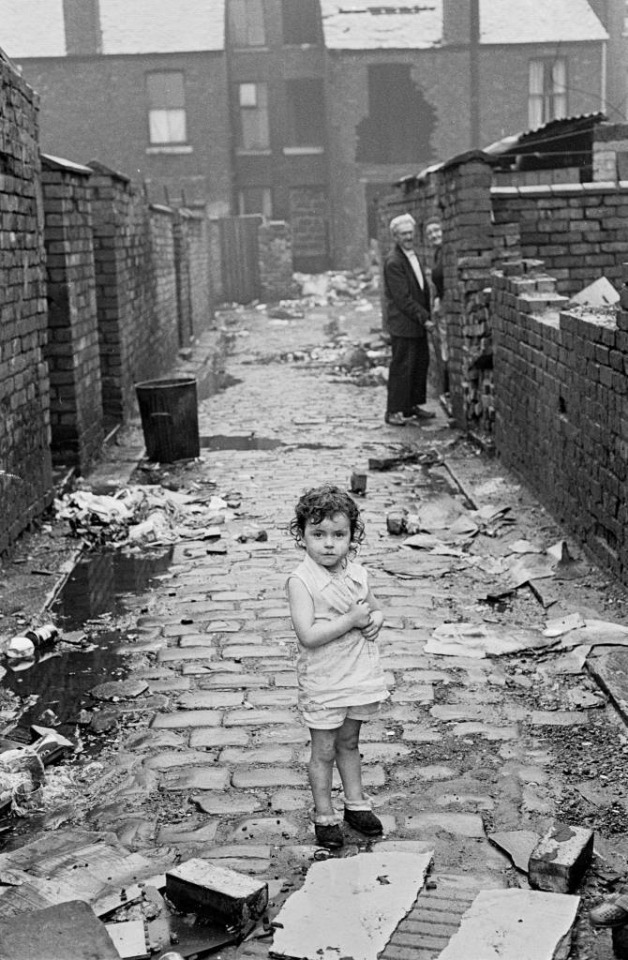
but like... imagine snape growing up there, like that, with no sense of community and parents who couldn't afford to or weren't able to care for him properly. this is so far beyond 'weasley poor' with their warm, cosy home and plenty to eat; this is gaunt poor, improper housing, and conditions that regularly made people ill
perhaps the Snapes had to rely on the black market to even eat enough, if they could afford it; I'm picturing chest infections and frost on the insides of the windows over the winters, and flies crawling in the house in the summers - and apparently limited use of magic at the time snape was growing up to rectify any of it, else the descriptions wouldn't be so consistently negative (and evocative) with a potential swarm of flies in his bedroom
(wonder if he was underage here, and using his wand since his mother would've had one, or whether it's a snippet of post-hogwarts snape; the next memory is of snape on a broomstick, so presumably that's at hogwarts, and he was underage in the fly memory, trapped/hiding/sulking in his room)
then he gets to hogwarts with the likes of the malfoys, who have a whole mansion and peacocks and house elves and can afford anything they want, and they look down on the weasleys and their comfortable one-'moderate'-income supporting a seven-child home as if they were cockroaches. what on earth would they have thought of snape, if they knew? he had factual knowledge of the magical world, but i doubt he had that "raised in the magical world" vibe they so desperately want to protect
#severus snape#pro snape#snape#snape fandom#professor snape#pro severus snape#young snape#spinner's end#need to stop thinking about snape when i have things to do
85 notes
·
View notes
Text
1930, crisis & Woods…
A History Lesson.
Disclaimer: Sorry if the tone of this post is too blunt, raw, etc. I cried while writing this, but I couldn’t help it. I really wanted to write this because my curiosity and love for history mixed with one of the characters I care about most and his context. And yes, it brought out a lot of things from within me that I didn’t even know I had.
Although I had learned and read about this event since I was a child—something often mentioned in my country as a constant reminder of what to avoid—studying it as a child, as a teenager, and now revisiting it through a particular character (or several) is completely different...
Please don’t take this personally, beautiful person <3. Here, we’re only seeking informative purposes in this post.
So, read it at your own discretion because this is going to start off strong.

I feel like NO ONE is taking into account the HISTORICAL CONTEXT of ALL the Black Ops characters (Not necessarily here, but in different media).... Adler was born in 1937... Weaver in 1936... Woods in 1930...
Damn, even the official wiki states that Woods was born in 1937 in Pennsylvania and that as a child, he ran away from home and wandered the streets until he joined the military at 18, or maybe even earlier. It wouldn’t surprise me if he lied about his age to enlist sooner because WE’RE TALKING ABOUT FRANK WOODS BEING BORN DURING THE GREAT DEPRESSION OF 1930!!!!
“Frank Woods was born on March 20, 1930, and grew up in Philadelphia, Pennsylvania. He ran away from home as a young child, forced to rely on street smarts and his instincts. Woods quickly learned to be completely independent.” Text quoted from the wiki.
Did no one read about how families literally had NO FOOD to feed their children???? Did no one read about how families SOLD their children to avoid having so many mouths to feed? Was I the only one who saw those photos??? Where mothers cried and covered their faces IN SHAME for having to SELL their CHILDREN who weren’t even 5 years old. Well, in EXACTLY THAT CONTEXT, Frank Woods was born and raised…

I think many people aren’t considering, or aren’t taking into account, the historical and social context in which these characters grew up. They’re judging them with a 2025 mindset, without stopping to think about what it meant to live in the 30s, 40s, and 50s.

“In the coal fields of Pennsylvania, three or four families crowded into single-room shacks and survived on wild herbs. In Arkansas, families were found living in caves. In Oakland, California, entire families lived in sewer pipes.” Woods was born in the midst of the Great Depression (1930), a period of brutal extreme poverty. Families literally starved to death, and many sold or abandoned their children because they couldn’t support them. The fact that Woods lived on the streets from a young age makes sense in this context. He likely never had a real family, and that explains his personality: aggressive, independent, with a survivor’s mentality. Enlisting in the military at 18 (or earlier, lying about his age) is completely logical for someone with his background.
“More than 200,000 vagrant children roamed the country as a result of the disintegration of their families.” And Woods was one of them.

Adler and Weaver, on the other hand, were born in the midst of World War II (1936 and 1937). This means their early years were marked by a world entirely at war, with resource shortages, constant fear, and an uncertain future. Weaver wasn’t even born in the U.S., but in the Soviet Union, which endured HORRORS during the war. And let’s not forget that his childhood wasn’t just shaped by the war, but also by Stalin’s dictatorship, which brought repression, purges, and fear even within families themselves. Most players have no idea about the real historical context, and I DON’T blame anyone for not knowing, because these are character details that don’t affect or influence the plot. But for me, at least, I don’t like to overlook them. Some see the characters as "action heroes" and not as men who grew up in brutal contexts that shaped their worldview. They don’t ask what it means to have been born in 1930, 1936, or 1937. They don’t think about how war, poverty, dictatorship, and the Cold War affected their mentalities. And the worst part is that they judge them with today’s mindset. Of course, in 2025, we think differently about relationships, trauma, and life. But in the 50s, 60s, 70s, and 80s, when these characters grew up and lived their youth, the mentality was completely different. You can’t expect them to think or act like someone born in 2000 or 2010 would.
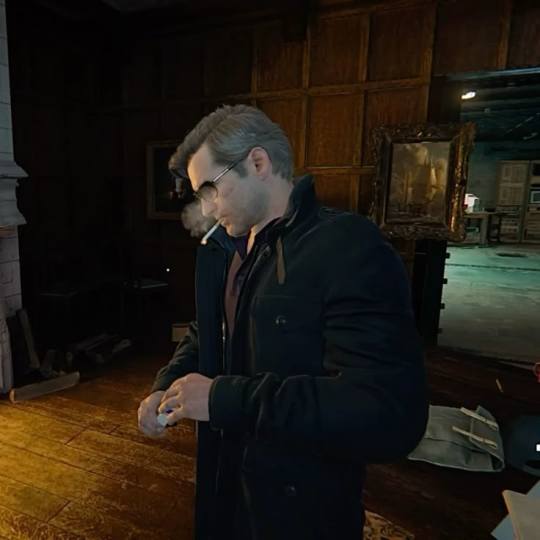

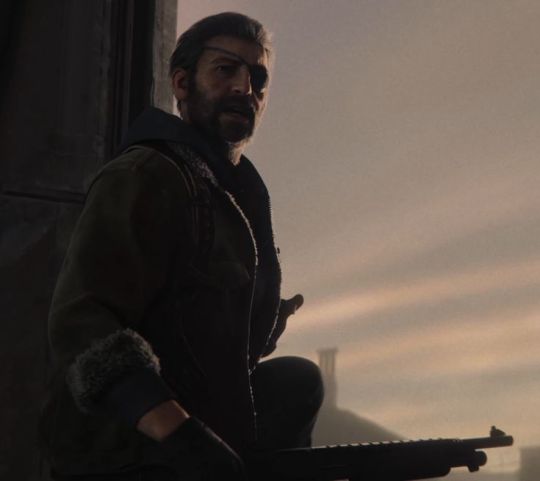
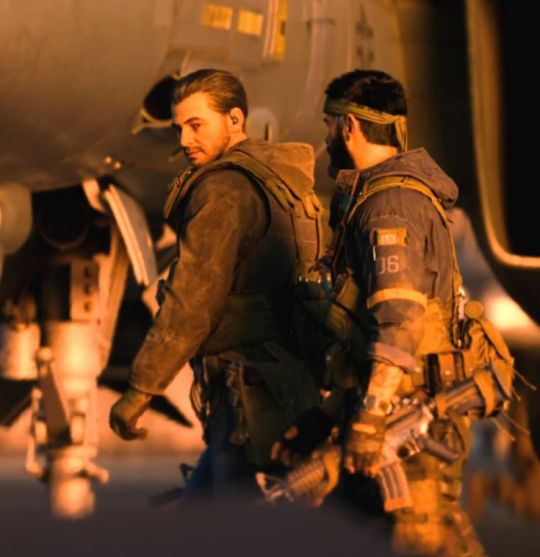
Adler and Weaver, on the other hand, were born in the midst of World War II (1936 and 1937). This means their early years were marked by a world entirely at war, with resource shortages, constant fear, and an uncertain future. Weaver wasn’t even born in the U.S., but in the Soviet Union, which endured HORRORS during the war. And let’s not forget that his childhood wasn’t just shaped by the war, but also by Stalin’s dictatorship, which brought repression, purges, and fear even within families themselves. Most players have no idea about the real historical context, and I DON’T blame anyone for not knowing, because these are character details that don’t affect or influence the plot. But for me, at least, I don’t like to overlook them. Some see the characters as "action heroes" and not as men who grew up in brutal contexts that shaped their worldview. They don’t ask what it means to have been born in 1930, 1936, or 1937. They don’t think about how war, poverty, dictatorship, and the Cold War affected their mentalities. And the worst part is that they judge them with today’s mindset. Of course, in 2025, we think differently about relationships, trauma, and life. But in the 50s, 60s, 70s, and 80s, when these characters grew up and lived their youth, the mentality was completely different. You can’t expect them to think or act like someone born in 2000 or 2010 would.
So, getting back to the topic…
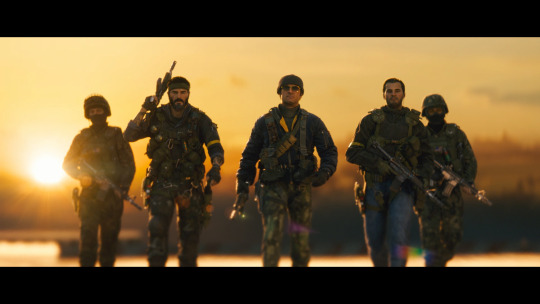
✨Express history lesson with the Black Ops crew✨
1930s: THE GREAT DEPRESSION AND SURVIVAL (1929-1939) When Woods was born in 1930, the U.S. was in its worst economic crisis in history: the Great Depression. The Wall Street stock market had collapsed in 1929, and millions of people were left without jobs or homes. Values and mindset of the 1930s in the U.S.:
Survival at all costs: There was no time to think about emotions or trauma; the priority was getting food. People hardened because they couldn’t afford to be vulnerable.
Extreme self-reliance: The government didn’t help much, so everyone had to find a way to survive on their own. If you starved, it was your problem.
Strong machismo: Women didn’t have real labor rights, and their role was to "take care of the home." If a man couldn’t provide for his family, he was seen as a failure.
Extreme racism: Racial segregation was the norm. Black and white people couldn’t share bathrooms, restaurants, or public transportation.

Impact on Woods:
He grew up on the streets, without a stable family or protection. He learned from a young age that no one was going to help him and that he had to be strong on his own.
He most likely experienced extreme hunger and violence. He became a natural fighter out of necessity.
"Tough guy" mentality: Back then, expressing emotions was seen as weakness. Woods learned that to survive, he had to be aggressive and self-reliant.
1940s: WORLD WAR II AND PATRIOTISM (1939-1945) When Adler and Weaver were born (1936 and 1937), the world was at war. The U.S. entered World War II in 1941, and society changed dramatically. Values and mindset of the 1940s:
Hyper-patriotism: The war made sacrifice for the country the most important thing. Men were pressured to enlist.
Strict gender roles: Men went to war; women stayed home or worked in factories to support the war effort.
Paranoia and espionage: The war created constant fear of the "enemy," especially after the U.S. discovered concentration camps in Germany and later dropped atomic bombs.
Children grew up fast: There was no normal childhood. Kids saw their parents go to war, heard news of bombings, and learned that the world was a cruel place.
Impact on Adler and Weaver:
They learned that violence was normal. From a young age, they grew up seeing soldiers and weapons everywhere.
The enemy was real. Adler, growing up in the U.S., absorbed from childhood that Nazis, Soviets, and Japanese were "the enemy."
Weaver, on the other hand, was born in the USSR and lived under a dictatorship. As a Soviet, he grew up in a world where anyone could betray you, where the KGB spied on its own people, and where a simple rumor could send you to a labor camp in Siberia.
1950s: COLD WAR (1945-1959) After World War II, the USSR and the U.S. entered the Cold War, a power struggle between communism and capitalism. People lived with constant paranoia, fear of nuclear war, and hatred between the U.S. and the USSR. Values and mindset of the 1950s:
Structural racism: Racial segregation still existed in the U.S. (separate bathrooms and restaurants for Black and white people).
Political paranoia: People were afraid of being accused of being communists. Being a communist could ruin your life.
Fixation on the "perfect family": Television and advertising portrayed the American dream as getting married, having kids, and living in a house with a yard.
Impact on Adler and Weaver:
Weaver, who emigrated to the U.S. during this time, likely faced a lot of racism and discrimination. He was seen as a "Russian communist," even if he wasn’t.
Adler, raised in the U.S., grew up with the mindset that communism was "the great enemy."
Work was everything. The CIA, the military, or the war were more important than any personal relationships.
As a small personal note, I’d say this is where we can clearly see the power of propaganda over the general population in a society and how fear intensifies everything.

1960s: VIETNAM WAR AND POLITICAL VIOLENCE By this time, our characters were adults and starting to work as soldiers or agents. Values and mindset of the 1960s:
Vietnam War: The U.S. sent thousands of young men to fight in Vietnam. This traumatized an entire generation.
Distrust in the government: Corruption scandals and the assassination of JFK made many stop believing in institutions.
Impact on Woods, Adler, and Weaver:
They were sent to war. They experienced brutal things and had to kill without question.
Adler and Woods saw the brutality of war and understood that the government lies.
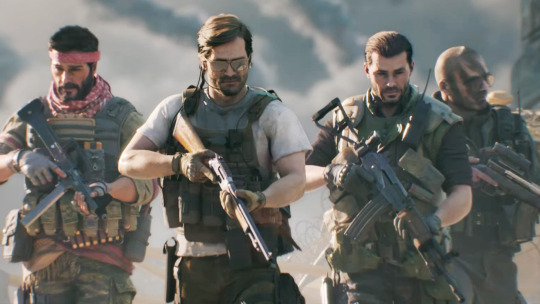
1970s and 1980s: EXTREME COLD WAR AND TOTAL CYNICISM By this time, our guys were veterans and had seen it all. They no longer trusted anything or anyone. Values and mindset of the 70s-80s:
Total cynicism: People realized that governments lie and manipulate.
Emotional detachment: No one wanted to form lasting relationships because life was uncertain.
Appearance of success: The 80s glorified money, image, and power.
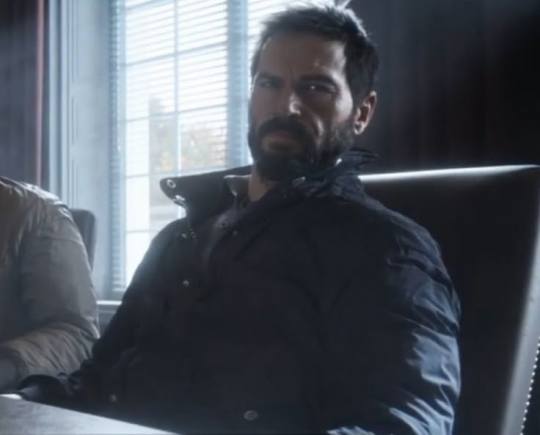
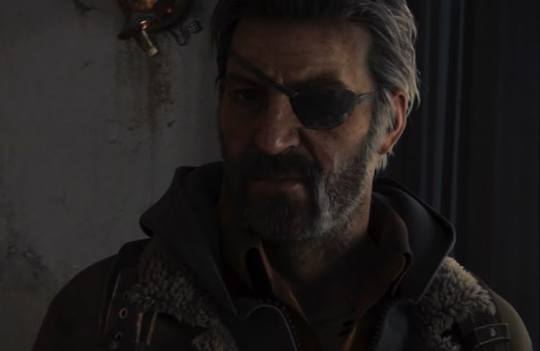
Impact on our characters:
Adler and Weaver, as CIA agents, learned that everything was a game of betrayals.
Woods became even more skeptical and hardened.
Adler focused more on his career and left any personal life behind.
Conclusion: You can’t judge them with a modern mindset These characters didn’t grow up in a world of social media, equality, and therapy. They grew up in a world of war, hunger, and betrayal. Their values were shaped by these events, and what seems "normal" to us today wasn’t for them. That’s why Adler might be distant with women, Weaver might be a womanizer, and Woods is aggressive. It’s not because they’re "bad," but because that’s how life was in their era, and according to these contexts, I consider possibilities—more or less realistic—based on everything they lived through and absorbed in their early years.
I’m not saying we should justify their actions, but understanding their context helps us see them as more than just action characters. Adler, Woods, Mason, Hudson, Weaver—ALL of them belong to the Silent Generation (people born between 1928 and 1945). The term was first used in 1951 in an article by the American magazine Time, and it stems from their supposed reluctance to express their political opinions. Some attribute this attitude to the fact that, as young adults, these individuals grew up during McCarthyism, in a climate of surveillance and persecution of dissent in the United States and much of the Western world.
When the Silent Generation began to mature after World War II, they faced a devastated social order, within which they would spend their early adulthood, and they found a new enemy in communism through the betrayal of postwar agreements and the rise of the Soviet Bloc. Unlike the previous generation, which had fought to "change the system," the Silent Generation sought to work within the system. They did so by keeping their heads down and working hard, thus earning the label of "silent." This fits perfectly with our Black Ops crew, as it reflects everything they had to live through and, in part, what we witness in their stories.
As a final detail, I want to dedicate this, especially the part about Woods, to a particular friend, because, as he once told me, "I’ve known Woods for 15 years," since he’s his favorite character, and I know he would love this, given all the years he’s been playing this incredible saga.
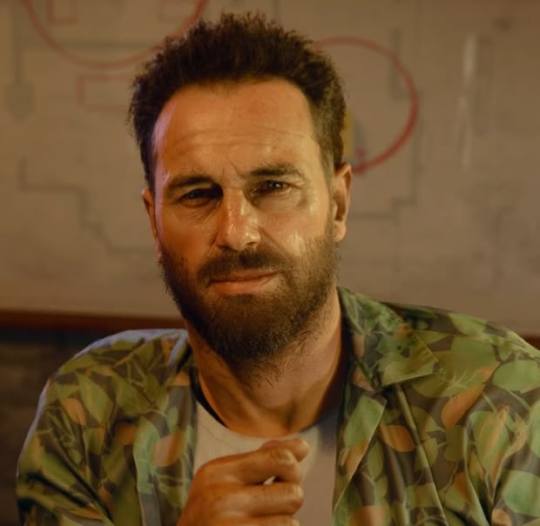
Una clase de historia
Disclaimer: Perdón si el tono de esta publicación es muy brusco, crudo, etc.
Yo misma lloré escribiendo esto, pero no pude evitarlo, realmente quería escribir esto porque se mezcló mi curiosidad y gusto por la historia junto con uno de los personajes que más quiero y su contexto. Y sí, sacó muchas cosas de mí y de mi interior que ni yo misma sabía que tenía.
Si bien desde niña había aprendido y leído sobre este evento, algo que se suele nombrar en mi país como recordatorio constante de lo que hay que evitar, una cosa es estudiarlo de niña, otra de adolescente y ahora, revisionarlo a través de un personaje en particular, o varios...
Por favor, no te lo tomes personal, personita hermosa <3 Aquí solo buscamos fines informativos en esta publicación.
Así que leelo bajo tu propio discernimiento porque esto va a empezar fuerte.
Siento que NADIE está teniendo en cuenta el contexto HISTÓRICO de TODOS los personajes de Black Ops... Adler nació en 1937...Weaver en 1936... Woods en 1930... (No necesariamente aquí, pero si en distintos medios).
Carajo, hasta en la wiki oficial ponen que Woods nació en 1937 en Pennsylvania y que de niño se escapó de su casa y vago por las calles hasta que a los 18, o quizás antes, entró al ejército, aunque no me sorprendería que haya mentido de su edad para entrar antes, porque ESTAMOS HABLANDO DE QUE FRANK WOODS NACIÓ EN LA GRAN DEPRESIÓN DE 1930!!!!
“Frank Woods nació el 20 de marzo del 1930 y se crió en Filadelfia, Pensilvania. Se escapó de su casa cuando era un niño pequeño obligado a confiar en la inteligencia de la calle y seguir sus instintos. Woods aprendió rápidamente a ser completamente independiente.”
Texto citado desde la wiki.
¿Nadie leyó sobre cómo literalmente las familias NO tenían comida para alimentar a sus hijos????? ¿Nadie leyó historia sobre cómo las familias VENDÍAN a sus hijos para no tener tantas bocas que alimentar? ¿Qué acaso fui la única que vio esas fotos?? Donde las madres lloraban y se tapaban las caras DE VERGÜENZA por tener que VENDER a sus HIJOS que no llevaban ni a los 5 años. Bueno, en EXACTAMENTE ESE CONTEXTO nació y creció Frank Woods… Creo que muchos no están considerando, o no tienen en cuenta, el contexto histórico y social en el que crecieron estos personajes. Los están juzgando con la mentalidad de 2025, sin detenerse a pensar en lo que significaba vivir en los años 30, 40 y 50.
“En los yacimientos de carbón de Pensilvania, tres o cuatro familias se apiñaban en chozas de una sola habitación y vivían de hierbas silvestres. En Arkansas, se encontraron familias que habitaban en cuevas. En Oakland, California, familias enteras vivían en tuberías de alcantarillado.”
Woods nació en plena Gran Depresión (1930), un período en el que la pobreza extrema era brutal. Las familias se morían de hambre literalmente y muchas vendían a sus hijos o los abandonaban porque no podían mantenerlos. Que Woods haya vivido en las calles desde niño tiene sentido en este contexto. Probablemente nunca tuvo una familia real, y eso explica su personalidad: agresivo, independiente, con una mentalidad de superviviente. Entrar al ejército a los 18 (o antes, mintiendo sobre su edad) es algo totalmente lógico en alguien con su trasfondo. “Más de 200.000 niños vagabundos vagaban por el país como resultado de la desintegración de sus familias.” Y Woods, fue uno de esos.
Adler y Weaver, por otro lado, nacieron en plena Segunda Guerra Mundial (1936 y 1937). Esto significa que sus primeros años de vida estuvieron marcados por un mundo totalmente en guerra, con escasez de recursos, miedo constante y un futuro incierto. Weaver ni siquiera nació en EE.UU., sino en la Unión Soviética, que sufrió HORRORES durante la guerra. Y no olvidemos que su infancia no solo estuvo marcada por la guerra, sino también por la dictadura de Stalin, que traía represión, purgas y miedo incluso dentro de las propias familias.
La mayoría de los jugadores no tiene idea del contexto histórico real, y NO culpo a nadie que lo ignore, porque son detalles de los personajes que no afectan o influyen en la trama, pero que al menos a mí, no me gustan pasar por alto.
Algunos ven a los personajes como "héroes de acción" y no como hombres que crecieron en contextos brutales que moldearon su visión del mundo. No se preguntan qué significa haber nacido en 1930, 1936 o 1937. No piensan en cómo la guerra, la pobreza, la dictadura y la Guerra Fría afectaron sus mentalidades.
Y lo peor es que juzgan con la mentalidad de hoy. Claro, en 2025 pensamos diferente sobre las relaciones, el trauma y la vida. Pero en los años 50, 60, 70 y 80, cuando estos personajes crecieron y vivieron su juventud, la mentalidad era totalmente distinta. No puedes esperar que piensen o actúen como lo haría alguien nacido en el 2000 o 2010.
Clase exprés de historia con los chicos de Black Ops: AÑOS 30: LA GRAN DEPRESIÓN Y LA SOBREVIVENCIA (1929-1939)
Cuando Woods nació en 1930, EE.UU. estaba en su peor crisis económica de la historia: la Gran Depresión. La Bolsa de Wall Street había colapsado en 1929 y millones de personas quedaron sin trabajo ni hogar.
Valores y mentalidad de los años 30 en EE.UU.:
Sobrevivencia a toda costa: No había tiempo para pensar en emociones o traumas, la prioridad era conseguir comida. La gente se endureció porque no podían permitirse ser vulnerables.
Autosuficiencia extrema: El gobierno no ayudaba mucho, así que cada uno tenía que encontrar la forma de sobrevivir solo. Si te morías de hambre, era tu problema.
Machismo fuerte: Las mujeres no tenían derechos laborales reales y su papel era "cuidar el hogar". Si un hombre no podía mantener a su familia, era visto como un fracasado.
Racismo extremo: La segregación racial era la norma. Negros y blancos no podían compartir baños, restaurantes, ni transporte público.
Impacto en Woods:
Creció en la calle, sin familia estable ni protección. Aprendió desde niño que nadie iba a ayudarlo y que tenía que ser fuerte por sí mismo.
Lo más seguro es que vivió hambre extrema y violencia. Se convirtió en un luchador nato por necesidad.
Mentalidad de "hombre rudo": En esa época, expresar emociones se veía como debilidad. Woods aprendió que para sobrevivir, debía ser agresivo y autosuficiente.
AÑOS 40: SEGUNDA GUERRA MUNDIAL Y PATRIOTISMO (1939-1945)
Cuando Adler y Weaver nacieron (1936 y 1937), el mundo estaba en guerra. EE.UU. entró a la Segunda Guerra Mundial en 1941, y toda la sociedad cambió radicalmente.
Valores y mentalidad de los años 40:
Hiperpatriotismo: La guerra hizo que el sacrificio por el país fuera lo más importante. Los hombres eran presionados para alistarse.
Roles de género marcados: Los hombres iban a la guerra, las mujeres se quedaban en casa o trabajaban en fábricas para apoyar la guerra.
Paranoia y espionaje: La guerra generó un miedo constante al "enemigo", sobre todo después de que EE.UU. descubrió campos de concentración en Alemania y luego lanzó las bombas atómicas.
Los niños crecían rápido: No había infancia normal. Los niños veían a sus padres ir a la guerra, escuchaban noticias de bombardeos y aprendían que el mundo era un lugar cruel.
Impacto en Adler y Weaver:
Aprendieron que la violencia era normal. Desde pequeños, crecieron viendo a soldados y armas por todos lados.
El enemigo era real. Adler, creciendo en EE.UU., mamó desde niño que los nazis, los soviéticos y los japoneses eran "el mal".
Weaver, en cambio, nació en la URSS, y desde niño vivió en una dictadura. Siendo soviético, creció en un mundo donde cualquier persona podía traicionarte, donde la KGB espiaba a su propia gente y donde un simple rumor podía mandarte a un campo de trabajo en Siberia.
AÑOS 50: GUERRA FRÍA (1945-1959)
Después de la Segunda Guerra Mundial, la URSS y EE.UU. entraron en la Guerra Fría, una lucha de poder entre el comunismo y el capitalismo. Se vivía con paranoia constante, miedo a la guerra nuclear y odio entre EE.UU. y la URSS.
Valores y mentalidad de los años 50:
Racismo estructural: Todavía existía segregación racial en EE.UU. (baños y restaurantes separados para negros y blancos).
Paranoia política: La gente tenía miedo de ser acusada de comunista. Ser comunista podía arruinarte la vida.
Fijación con la familia "perfecta": La televisión y la publicidad mostraban que el sueño americano era casarse, tener hijos y vivir en una casa con jardín.
Impacto en Adler y Weaver:
Weaver, que emigró a EE.UU. en esta época, debió haber sufrido mucho racismo y discriminación. Lo veían como un "ruso comunista", aunque no lo fuera.
Adler, criado en EE.UU., creció con la mentalidad de que el comunismo era "el gran enemigo".
El trabajo lo era todo. La CIA, el ejército o la guerra eran más importantes que cualquier relación personal.
Como pequeño punto de mi parte, diría que acá podemos observar el claro poder que tiene la propaganda sobre la población común en una sociedad y como el miedo intensifica todo.
AÑOS 60: GUERRA DE VIETNAM Y VIOLENCIA POLÍTICA
Aquí nuestros personajes ya eran adultos y empezaban a trabajar como soldados o agentes.
Valores y mentalidad de los años 60:
Guerra de Vietnam: EE.UU. mandó a miles de jóvenes a pelear en Vietnam. Esto traumó a toda una generación.
Desconfianza en el gobierno: Los escándalos de corrupción y el asesinato de JFK hicieron que muchos dejaran de creer en las instituciones.
Impacto en Woods, Adler y Weaver:
Fueron enviados a la guerra. Vivieron cosas brutales y tuvieron que matar sin cuestionar.
Adler y Woods vieron la brutalidad de la guerra y entendieron que el gobierno miente.
AÑOS 70 y 80: GUERRA FRÍA EXTREMA Y CINISMO TOTAL
Aquí nuestros chicos ya eran veteranos y habían visto de todo. Ya no confiaban en nada ni nadie.
Valores y mentalidad de los 70-80:
Cinismo total: La gente se dio cuenta de que los gobiernos mienten y manipulan.
Desapego emocional: Nadie quería formar relaciones duraderas porque la vida era incierta.
Apariencia de éxito: Los 80 glorificaron el dinero, la imagen y el poder.
Impacto en nuestros personajes:
Adler y Weaver, como agentes de la CIA, aprendieron que todo era un juego de traiciones.
Woods se volvió aún más escéptico y duro.
Adler se enfocó más en su carrera y dejó de lado cualquier vida personal.
CONCLUSIÓN: NO PUEDES JUZGARLOS CON MENTALIDAD MODERNA
Estos personajes no crecieron en un mundo de redes sociales, igualdad y terapia psicológica. Crecieron en un mundo de guerra, hambre, y traición. Sus valores fueron moldeados por estos eventos, y lo que hoy nos parece "normal" para ellos no lo era.
Por eso Adler podría ser distante con las mujeres, Weaver podría ser mujeriego y Woods es agresivo. No es porque sean "malos", es porque así era la vida en su época y acorde a estos contextos y considero posibilidades, más o menos realistas, en base a todo lo que habrán vivido y mamado en sus primeros años de vida.No digo que justifiquemos sus acciones, pero entender su contexto nos ayuda a verlos como algo más que personajes de acción.
Adler, Woods, Mason, Hudson, Weaver, TODOS, pertenecen a la Silent Generation. (personas que nacieron entre 1928 y 1945).
El término se empleó por primera vez en 1951, en un artículo de la revista estadounidense Time, y se debe a la supuesta reticencia para expresar sus opiniones políticas. Algunos relacionan esta actitud al hecho de que, como jóvenes adultas, estas personas crecieron durante el macartismo, en un clima de vigilancia y persecución de la disidencia en Estados Unidos y buena parte de Occidente. Cuando la generación silenciosa comenzó a madurar después de la Segunda Guerra Mundial, se enfrentaron a un orden social devastado, dentro del cual pasarían su temprana edad adulta, y encontraron un nuevo enemigo en el comunismo a través de la traición de los acuerdos de la posguerra y el surgimiento del Bloque Soviético. A diferencia de la generación anterior que había luchado por “cambiar el sistema”, la generación silenciosa trataba de trabajar dentro del sistema. Lo hicieron manteniendo la cabeza baja y trabajando duro, ganándose así la etiqueta de silenciosos. Lo que encaja perfectamente con nuestros chicos Black Ops, ya que es todo lo que tuvieron que vivir y de lo que en parte, nosotros somos partícipes en sus historias.
Como último detalle quiero dedicarle esto, especialmente la parte de Woods, a un amigo en particular, porque, como él mismo me dijo una vez “A Woods lo conozco desde hace 15 años” ya que es su personaje favorito y sé que esto le encantaría a él por todos los años a los que viene jugando a esta increible saga.
<3
#call of duty#russell adler#frank woods#grigori weaver#cod#black ops 6#call of duty black ops#cod bo6#bo6#cod cold war#russell adler cod#frank woods cod#black ops#call of duty cold war#cod black ops cold war#call of duty black ops cold war#call of duty black ops 6#1930#80s#60s#50s#40s#90s#cod black ops#cod black ops 6#cod bocw#cod bo cold war#cod bo cw#cod bo#cod bo1
45 notes
·
View notes
Text

Guz grinned at her model, as it completed the first loop around the layout of her new quarters. Guz explained the contents of the train--solid rocket boosters for the North Meridian Space Launch Facility.
"It's not really prototypical though, is it?" Rutherford asked.
"A steam engine pulling high explosives does seem illogical," T'lyn said.
Guz smiled and flapped her hands. "It is prototypical, and here's how it happened--"

Around the late 2330s, an oil crisis shocked Mellanus. It was a while before it got really bad, and the rationing had to begin, but it skyrocketed the price of gasoline and diesel and plastic products. As Omen approached, the railways identified a problem--there might not be enough oil to migrate everyone and move all the goods that need to be moved to support the migration as the climate changed. With the increasing diesel fuel shortages, railways had to start taking their old coal and wood burning steam engines out of mothballs.
This one, No.2475, was taken out of a museum. It only rarely actually ran, so it was in poor mechanical condition, but when it re-entered service its paint and brass was pristine.
The diesel locomotive that had been scheduled to take the train of SRBs ran out of fuel during the first hill climb, and the depot didn't have enough fuel to spare, so 2475 was diverted from its passenger duties to take the train the rest of the way.
Eventually most of the old timer steam engines ended up back in museums or scrapped, but as the oil crisis waxed, the railways invented Advanced Steam engines to be as fuel efficient as possible.
"--like that tank engine, Sam," Guz finished, pointing at the little yellow switcher that Rutherford and T'lyn had been inspecting.
#Brad Boimler#Eaurp Guz#Sam Rutherford#T'lyn#Lisdolin Kerman#Kerbal#Star Trek#Star Trek Lower Decks#Lower Decks#Rocket#SRB#solid rocket booster#launch vehicle#train#steam train#steam locomotive#locomotive#Garratt#art#digital art#fanart#star trek fan art#space program#mellanoid space program#Mellanoid Slime#Mellanoid Slime Worm#Slime Trains
74 notes
·
View notes
Text

"MASTERS AND MEN CONTINUE FIGHT IN COAL STRIKE," Vancouver Sun. October 28, 1912. Page 4. --- Situation Is Becoming Acute and Statement Is Made That Mineral Is Now Scarce --- TROUBLE SPREADS TO OTHER CENTRES ---- Non-union Men Have Been Engaged But Are Sent Back to Vancouver by Society ---- Efforts to end the coal strike have not yet accomplished as much as was hoped and expected. A week or ten days ago the position of the miners believed then that the strike would be at an end within two weeks at most. The employees of the Western Fuel company had refused to join in a sympathetic strike, and the United Mine Workers of America had not at that time come to the support of the Nanaimo union. Under such a situation it was thought that as soon as the inine owners attempted to put new men at work there would be a rush of the strikers to get their old places.
Coal Is Scarce. No such rush, however, has occurred; and meantime the scarcity of coal is becoming more acute. Ordinarily the British Columbia mines export more than a million tons per annum to the States; but such exports have now been reduced or cut off, and at least one of the important Vancouver dealers is importing from the States.
Customers of this firm are handed a notice saying in part:
"During the continuance of the present labor trouble in the coal mines on Vancouver island, we are bringing in carbonado coal from Tacoma to help us out. This coal is a bituminous small pea, well washed and cleaned. It makes an excellent coal for any kind of heating system, but in firing, care should be taken not to smother the fire, but use plenty of kindling."
Imports from the interior also continue; but all these devices do not offset the shortage caused by the strike against the Canadian Colleries Co. The trouble has not spread to the other companies, but the labor leaders declare in contradiction from despatches received from other sources that should the employees of the Western Fuel Co. be called out, they would obey the call.
The total yearly consumption of Vancouver and suburbs, including that of railway and steamship lines having terminals here, is estimated at a million tons, or somewhat less, whereas the output of the Canadian Collieries company even in 1910 was 898,888 tons.
Can Support Strike. A new development in the situation is that the United Mine Workers of America are now supporting the strike at Nanaimo. "This powerful organization," said an officer of the Trades and Labor council, "is so big and rich that it can support a little strike like this on the island for an eternity without feeling the strain." In describing the struggle an officer of the United Mine Workers of America makes the following assertion:
"The situation at Cumberland and Ladysmith, so far as the miners are concerned, remains unchanged, except that the company is resorting to every means in its power to put scab coal on the market. Just how successful they have been you will see from the following: For ten days now they have been trying to work No. 7 and No. 4 mines, and they have produced 800 tons of coal in that time. When working under normal conditions the output is 2.500 tons daily. They have shipped twenty scabs into Cumberland, but we have been successful in sending eighteen of them back to Vancouver."
#vancouver island#nanaimo#coal mining#coal miners#strike#coal shortage#heating coal#scabs#picket lines#union solidarity#united mine workers#canada colleries company#resource extraction#resource capitalism#capitalism in canada#working class struggle
0 notes
Text
The $10 billion container shipping industry, the one that moves boxes full of everything and anything around global seas, has this phenomenon called “blank sailings.”
To understand the term of art, think of the world-spanning ocean-bound trade economy like a bus system, where several buses—or ships—are making stops along a set route. If the people running the bus system—or the shipping company—realize there’s not enough passenger demand for their bus to run the route in the middle of the day, they’ll cancel one of those circuits. Same with shipping companies: If they realize there aren’t enough bookings to justify a container ship running its standard route, the company will “blank” the sailing, combining the goods that were supposed to be on that ship with those traveling later in the week.
This is normal shipping stuff. But not this month. As the effects of President Donald Trump’s new tariffs on foreign goods—and the trade war they’ve ignited—set in, many shippers who usually send goods across the Pacific Ocean have paused or canceled their shipments. Data from the supply-chain research firm Sea-Intelligence shows that blank sailings to the US’s West Coast spiked 13 percent this week, and is due to jump to 28 percent the week after. The Port of Los Angeles, the nation’s largest, expects 17 total blank sailings in May, which means the port will lose 224,000 “twenty-foot equivalent units of capacity,” the standard metric used to measure the contents in one container. In total, the port’s data shows, import volumes will be down 31 percent next week compared to the same week last year.
That means a lot of stuff once bound for the US is no longer coming—and an especially lot of that stuff is from China. This is the unusual part. “This is very extreme,” says Simon Heaney, the senior manager of container research at Drewry, a maritime research and advisory firm. “It’s unprecedented in the history of containerization.” The blank sailings, he says, are “an early canary in the coal mine. When you see carriers suspending services, it tells you there isn’t enough demand [for goods], or that freight rates are falling very quickly.”
What does that mean for consumers? Right now, the US government has said that it is negotiating tariff levels with many countries, including China, so the container shipping picture could change quickly as deals are signed or dashed. But at this point, some shortages are baked in. Experts say low-cost retail goods, like toys, are very likely to get more expensive in the US, as fewer ships make it to port and scarcity pushes up prices.
Trump acknowledged as much in a Cabinet meeting this week: “Maybe the children will have two dolls instead of 30 dolls, and maybe the two dolls will cost a couple of bucks more,” he said.
But beyond a few weeks, even the tea leaves of the global container shipping industry and its “blank sailing” schedule can’t predict what will happen to global trade. Some of the blank sailings currently being recorded are happening because of economic uncertainty, says Jean-Paul Rodrigue, a professor of maritime business administration who studies port operations at the University of Texas A&M-Galveston. Firms and countries are “delaying until they know what the new rules of the game are. We are setting up the board, we are rolling the dice,” he says. “The rules have changed.” That means that, if deals are made, those goods can come back.
The real global warning sign, experts say, is if shipping companies nix those blank sailings for outright route cancellations. Blank sailings are “a Band-Aid measure,” says Heaney, the researcher. If container shipping companies abort routes altogether, though, it’s a sign that they believe the global economy is seeing lasting structural changes. These cancellations have built up but are not yet widespread, experts say—meaning it’s possible the global trade apparatus could get back on track.
No matter what happens in May, the question marks surrounding the global economy, and what things will cost consumers, will likely linger for months. Drewry, the research firm, has warned shipping clients of two upcoming periods of potential instability.
The first is in late June to July, when the Trump administration will decide whether to reimplement so-called "reciprocal tariffs” levied on individual countries for trade imbalances. Delayed since last month, these specific import tariffs could reach levels exceeding 40 percent, shocking the global supply chain. Between now and then, global manufacturers will scramble to discover whether they can source consumer products including electronics and apparel from countries beyond China. But the idea that other producing countries, including Vietnam and Cambodia, might be able to replace demand for Chinese goods in that period is “fanciful,” says Heaney. If tariff levels go through as planned, “there’s going to be a contraction.” That means prices for consumer goods will likely go up.
The next big timeline question mark comes in October. That month, a new policy from the United States Trade Representative (a government agency in the executive branch) is due to kick in that would add extra fees for Chinese-operated and Chinese-built ships entering US ports. When the rule goes into effect, container shippers will likely have to reconceptualize their entire network, sending Chinese-associated ships to other parts of the world. And finagling a billion-dollar container shipping industry has its downsides, even if they’re temporary. “Whenever you get dramatic network changes, you also get scheduling issues, the network will be suboptimal. That will lead to higher costs,” says Heaney.
Whatever happens, the message is clear: Consumers concerned about rising prices should look to the sea.
31 notes
·
View notes
Text
Today's frustration is that the ALP and the Coalition are both floating the same dumb plan that varies only in the details (as usual). They're keen to cut the numbers of international students studying at Australian universities on the basis that we have a housing affordability crisis and if you can reduce the number of people arriving in the country who need housing, you can free up housing for everyone else.
On the surface that might briefly appear sensible, which is what you hope when you advertise to swing voters I guess. Except there's these three things that no politician seems to want to mention:
First: The cause of the housing affordability crisis is not increased migration — it's the collapse of our residential construction industry. Construction insolvencies were at a record high in 2023 and 2024. Stopping international student numbers doesn't address this problem, probably because this problem emerged from both the administrative structure of the average construction company and the supply chain disaster brought about by COVID-19 lockdowns, chip shortages (needed for auto manufacture etc) and Russia's invasion of Ukraine, and is therefore somewhat harder to fix than 'urgleblurgle foreigners stealing our homes.'
Second: International students in Australia take on part time and casual roles in our hospitality and retail sectors and contribute massively to that cohort of essential workers. I would love for retail and hospo workers to get paid more so I guess devastating the supply of employees in this sector would boost their value and, technically, make this kind of a mixed blessing? But it's not great for the sector as a whole, and I think it's important to point out that international students are not, as seems to be the narrative, leeches who take from our society: they pay money to be here, and then they frequently do valuable work in our communities.¹
Third, and, speaking with brutal pragmatism, the most important: if you take a second to look up Australia's top 25 exports on the DFAT website, you will see the first mention of education related services right underneath iron, coal and gas. Education is not only one of our most important exports, it's also one of the few that ISN'T an enormous green transition risk for our economy.
Forget the racism, cruelty and xenophobia² (and forget gutting half our national research funding) for just a second: this plan is likely to make Australians poorer.
Anyway, the Coalition's is a more severe cut to international student migration than the ALP's. I guess. So there's that. Ugh.
--
¹ I'm not getting into the politics of viewing people as opportunities for productivity here. I'm addressing a persistent point made by other people (and media outlets) who seem to feel it is in their interest to pretend they don't understand the basics of cause and effect.
² "[J]ust a second" because, obviously, those flaws in our culture are what make international students an acceptable scapegoat for the vagaries of circumstance and our failures of planning
#extremely frustrating#auspol#it's also not a major export to the USA so just jot that the fuck down lol
33 notes
·
View notes
Text
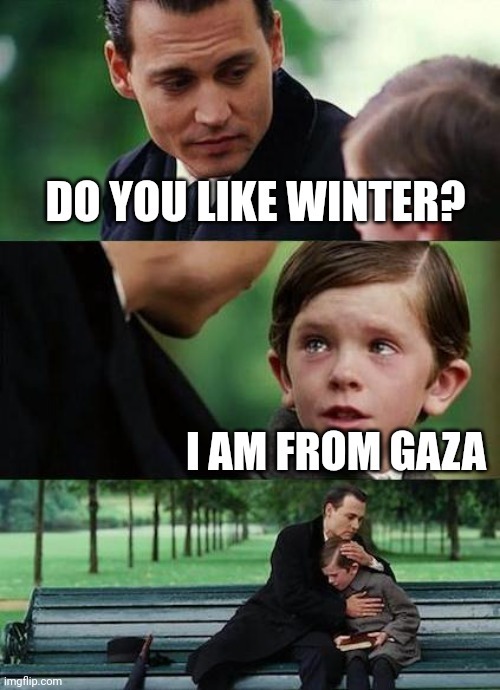
Wind howls outside like something out of a classic horror movie, a cold breeze sneaks through window cracks, and tiny rain drops knock your window in amusing rhythm. While inside, you lie beneath heavy blankets, watch some family movie with your loved ones, and hold a cup of hot chocolate that fills you with warmth and energy. Winter has always been a season of warmth, love and good times with my family. 😍😍
Sadly, all of this sounds now like a distant memory. People don't have a roof over head to protect them, most of them live in tents that barely stand to wind, and suffer from the lack of mattresses, blankets and warm clothes. Even heating devices are now longer available due to lack of power supply and the shortage of wood and coal. Winter is now a season of suffering, coldness and bitterness. 😞😞 But, you can help changing this.
I humbly ask you to donate to my campaign and share my story. Your support can help me buy warm clothes, blankets and mattresses for my kids, keeping them safe and healthy. I'm also expecting the birth of a new baby next January (which usually brings the coldest weather). I need to buy clothes and provide heating for this little one to ensure she stays safe and cozy (Yes, it's a girl 😇).
✅️My campaign is vetted by @gazavetters, my number verified on the list is ( #252 )✅️
Warm regards,
Alaa & his family
#free gaza#gaza#gaza genocide#gaza strip#help gaza#gaza gfm#gazaunderattack#palestine#palestine genocide
31 notes
·
View notes
Note
haiiiiii!!!! what do you think of this locomotive? ^_^

Is it electrified? The Swiss just invested in electrifying our rail system due to the coal shortages.
15 notes
·
View notes